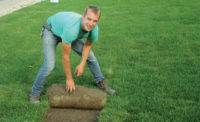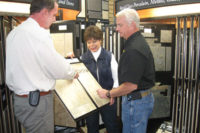The Trusted Sales Advisor
Goodwill & Loyalty

Take a look at the photo of me with a big bag of potato chips. Now I’m sure you’re wondering just why this photo of me with this junk food deserved to be published. Well, that bag of chips touched my heart and I consider it to be one of the nicest gestures of goodwill I’ve run into in a long time.

|
| What do potato chips have to do with selling flooring? Everything if you’re Kelly Kramer, whose kindness and goodwill earned him a future customer. |
Recently, a very old gentleman came into the store and needed just a small chunk of padding. So I went into the back and found what he needed. When I handed the pad to him he said, “What do I owe you?”
I said don’t worry about it. He replied are you sure because “I’ll be glad to pay for it.”
“No,” I responded, “it’s just a leftover piece and we don’t nickel and dime here.” Then I said what I always say when I give away small things—and I say it in a jovial tone. “Come back when you can spend the big money.” That always gets a laugh and a “we will do that.”
This piece of pad would have sold for about eight bucks, but instead of wasting time and an order invoice, I think that time was better spent building conversation and goodwill.
Now here’s the touching part. This gentleman went out of his way a few days later and brought that bag of chips to show his appreciation. I told him sincerely that this was a special gesture and that the world needed to have more people act like him. At this point, I almost felt bad because he added he was saving up to replace his living room carpet next year and that he would be back.
In a way it looks like I manipulated the situation in my favor by doing something nice. But that certainly was not my intention. If you read my last column in which I wrote about when I found and returned my customer’s antique diamond ring, you know it was a different situation but still similar. In that case, I was just doing what was right, but the loyalty effect was the same.
It’s times like that when I get rejuvenated in my faith that most people are basically good and kind. One thing I’ve fought hard to do in my selling career is to stay kind and have empathy for people. Because that’s often easy to fall away from when you make your living on the next sale.
When I came up with the title of my first book, “Selling Clean,” in was in response to all the negative and dirty selling tactics I had been taught and seen in every type of sales that I had observed. My thought was, “I’m a nice guy (mostly) and I don’t want that to change because I’m in sales.”
To me, any empathy or kindness I show just makes me feel good. So you could say it’s selfish. But gaining someone’s trust, confidence and loyalty are three very special things I strive for and a much nicer way to make a living than the opposite method.
One of the phrases I’ve coined is, “Always do what is in the best interests of your customer.” If that sounds naive and too simple, it’s not. Think about someone trying to sell you a high-ticket item. If all they did was try to find the best product to fit your given situation, find you the best value for your dollar and educate you on your purchase, wouldn’t you feel the goodwill and want to buy from that person?
I have a lawn equipment and repair place I do business with. I buy all my lawn movers, trimmers, leaf blowers, snow equipment, etc., from them. They sell mainly quality stuff—both professional and residential equipment.
The first time I went into Mac Equipment was to fix my lawn mower, which I had not purchased from them. The front counter/mechanic guy looked at the machine and said to wait a minute. He went to the back and came back out with a clip. Then he took about a half a minute and put the clip in place. Just like that the problem was solved. So, like my customer, I said, “What do I owe you.”
“No, you’re good it was just a clip,” he replied.
Even though I understood his methodology, I still felt that this was a person and place I could trust. So, two weeks later I came back looking for a weed edger. Like most men, “Tim the Tool Man,” I was looking at the giant, powerful ones. Then that same guy came over to advise me.
He asked me what kind of uses I had for the weed-wacker. So I explained. Then he said, “The one you’re looking at is way more than you need for your uses. Look at this smaller one. It’s still a pro model, very powerful and the line feed you’ve had problems with will never happen again.” He asked the right questions, I gave my previous problem and concerns, he explained how I could spend less and still fit my needs. Problem solved.
Then, jokingly, I said, “You must have read my book.” I explained I write about good customer service in flooring and that we were already on the same page so to speak. Now he and his family have become flooring customers of mine as well.
That’s what makes it so easy to stand out from the rest. Simply ask what is important to your buyer and fix it with your knowledgeable help. Showing goodwill can also mean not trying to sell the most expensive item, but just the quality that fits and gets the job done. Though, the next time I need some equipment and he tells me I need to buy a higher end machine to get the job done, I will take his advice.
As to my customer with the potato chips, thank you. When he comes back for his living room carpet you can bet I’m going to give him the best price on the carpet he has been saving for.
Goodwill and loyalty really are all that, and a bag of chips. Thanks for reading.
Based in Loveland, Colo., Kelly Kramer is an author, inventor and owner of Kelly’s Carpet Wagon. He is a 27-year veteran of the flooring industry, with 25 of those years as a retail sales advisor. To contact him with questions or to book him for public speaking engagements, call or email:
(970) 622-0077 | retaileducation@netzero.net
Looking for a reprint of this article?
From high-res PDFs to custom plaques, order your copy today!






